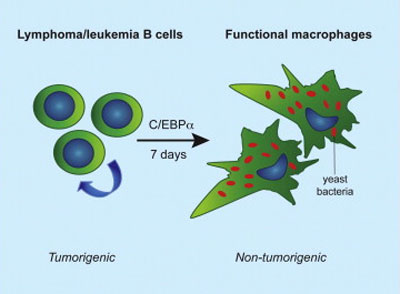| Apr 17, 2013 |
Cell reprogramming to cure leukaemia and lymphoma
|
|
(Nanowerk News) Scientists at the Centre for Applied Medical Research (CIMA) at the University of Navarre and the Centre for Genomic Regulation (CRG) in Barcelona have reprogrammed lymphfoma and leukaemia cells in such a way that they are no longer malignant. The resulting cells maintain their new condition of benign cells even when they are not being treated and reduce the possibilities of generating new tumours. The research results have been published in the Cell Reports journal ("C/EBPα Induces Highly Efficient Macrophage Transdifferentiation of B Lymphoma and Leukemia Cell Lines and Impairs Their Tumorigenicity").
|
 |
|
Leukaemia and lymphfoma are two kinds of cancer of the blood cells. Both diseases are treated mainly with chemiotherapy, radiotherapy and antibodies, with the aim of destroying the cancer cells. But there still remains a substantial number of patients that do not manage to overcome these illnesses using existing treatment.
|
|
"Our experiments show that cancer cells in humans can be transdifferentiated (transformed) into cells that are similar to normal ones. On malignant cells converting to macrophages (a cell type that divides very slowly), a way has been opened to a new therapeutic strategy that enables treating patients suffering from leukaemia and lymphfoma", explained doctors José A. Martínez Climent and Thomas Graf, from the CIMA and the CRG respectively, and leading co-researchers in the project.
|
|
Moreover, the researchers have shown that the capacity to generate tumours in immunosuppressed mice is drastically reduced, which suggests a new, highly effective form of treatment. Although the therapies used to date enable the elimination of cancer cells, the capacity to generate new tumours still has not been reduced completely. "We must continue investigating in order to apply these results to the benefit of the patients. The most important thing is that now we know that human cancer cells can be reprogrammed successfully and, moreover, this reprogramming diminishes the possibilities of reproducing the cancer. We are now trying to find chemical and pharmaceutical compounds with the same capacity for treating the cancer, not only in cell cultures but also in patients", underlined the study’s authors.
|

